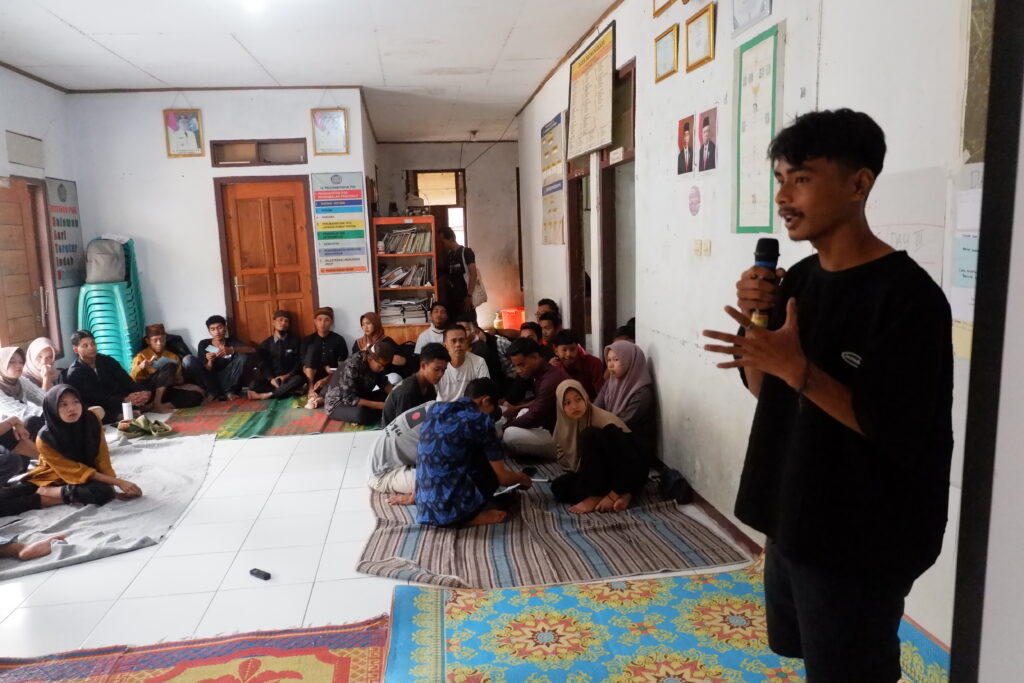Amidst the rapid flow of social change and tenurial conflicts that continue to hit indigenous communities in Lebak Regency, Banten, the Kawal Forum is present as a new voice in fighting for the rights of indigenous communities. The Lebak Customary Territory Consolidation and Advocacy Forum, which was founded in 2022 by nine elders and the Baduy community. Not only is it a forum for consolidation, but also a space for indigenous youth and women to be actively involved in tenure advocacy and fighting for indigenous rights.
The nine elders who founded the Kawal Forum include Kasepuhan Cibarani, Pasir Eurih, Cirompang, Jamrut, Bongkok, Cibedug, Cibeas, Karang, and the Baduy community. They bear great responsibility in ensuring that the tenure rights of indigenous peoples remain protected. Especially amidst the threat of land grabbing and unilateral claims by external parties.
Since its inception, the Kawal Forum has become a learning space for indigenous youth. Where they learn about their rights and hone their advocacy skills. This forum brings together various kasepuhan communities, allowing them to share experiences about social issues and tenurial conflicts faced by each community. Now, after going through the capacity building phase, the youth in this forum dare to step further into a more strategic field advocacy stage.
One real example of the work of the Kawal Forum can be seen in Kasepuhan Jamrut. Where they face land conflicts with the Mount Halimun-Salak National Park (TNGHS). Since June 2024, they have been involved in Kasepuhan Jamrut. Initiating meetings between local youth, traditional institutions, and the village government to discuss long-term solutions related to the prolonged tenurial conflict. In the process, the Kawal Forum also facilitated the preparation of customary area maps through the Participatory Mapping approach. Later it will become an important document in submitting customary forests.
The submission of customary forests is a strategic step taken by the Kawal Forum to ensure that the rights of indigenous peoples are legally protected. In this process, the youth who are members of the Kawal Forum not only act as technical facilitators. But also the main drivers who lead the strategic steps of the community. Their role is increasingly important because they are at the forefront of building consensus in the community regarding land and natural resource rights.
In Kasepuhan Jamrut, Forum Kawal has played a key role in building agreements with the community to begin the customary forest application process. They work closely with customary institutions and the village government. And they strive to ensure that the application process runs smoothly and that the tenure rights of the indigenous community are maintained.
One of the main strengths of the Kawal Forum is the solidarity between indigenous youth. In strong internal consolidation, forum members are able to facilitate dialogue between communities that have been separated by various challenges. With a collaborative approach, they have succeeded in building a shared understanding that the submission of customary forests is the best solution to protect the rights of indigenous peoples.
Discussions conducted by the Kawal Forum with customary institutions and village governments showed a strong will to protect tenure rights that are often threatened by external interests. They proved that indigenous youth are able to play an active role in tenure advocacy and become leaders of change in their communities.
The role of the Kawal Forum marks an important change in the pattern of advocacy in the Lebak indigenous community. If previously advocacy was mostly handled by indigenous elders, now young people are taking over this responsibility. With the support of new energy and initiatives, they balance the experience of their seniors with a more strategic and focused approach.
Support from RMI-The Indonesian Institute for Forest and Environment through the Estungkara program is also an important factor in strengthening the role of the Kawal Forum. In addition to providing technical guidance, this program encourages cross-generational involvement in advocacy. Ensuring that indigenous youth have a central role in protecting indigenous territories and tenure rights.
Although the advocacy journey is still long, their work has shown real results in the field. The process of submitting customary forests in Kasepuhan Jamrut is one example of good practice from the struggle of the Kawal Forum. They continue to accompany the community in dialogues with related parties, including the government, to ensure that tenure rights remain protected.
Amidst complex social and political dynamics, they teach that advocacy is not an instant process. It is a long journey that requires perseverance, consistency, and courage. With a deep understanding of indigenous rights and a mature advocacy strategy, Forum Kawal is a model for other communities in Lebak, and perhaps in various parts of Indonesia.
Through the Kawal Forum, the indigenous youth of Lebak prove that the struggle to defend indigenous rights is not only the task of the elders, but the responsibility of all members of the community. They do not just talk, but work together, build trust, and find sustainable solutions. Their work is proof that tenure advocacy can be done collaboratively and community-based, ensuring that the future of indigenous peoples in Lebak remains protected.


